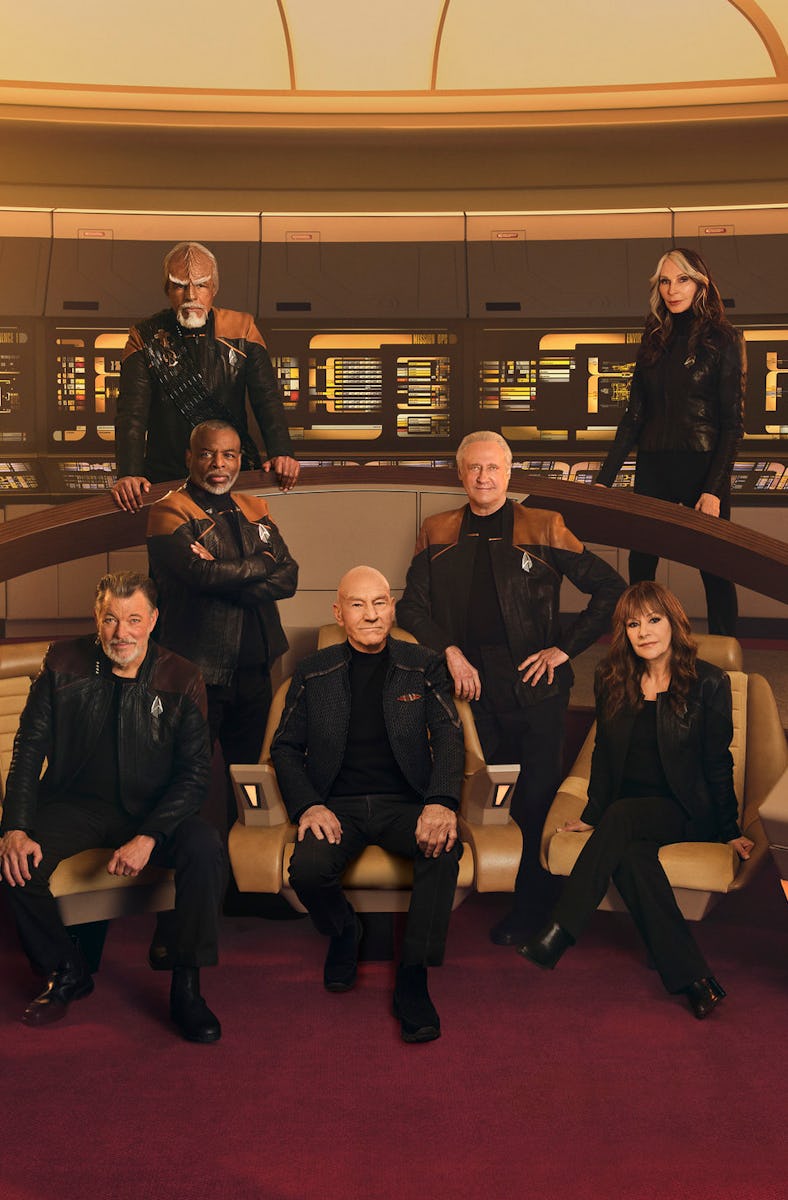Star Trek's Awards Sweep Proves Nostalgia Isn't a Dirty Word
The seeds of future sci-fi always come from the past.

For some science fiction fans, the genre is constantly in danger of becoming a beastly nostalgia-hungry ouroboros. But the march of time has proven that one generation’s outrage is another generation’s beloved memory. And that notion — that the upstart new thing will eventually become classic — is probably best exemplified by the journey of Star Trek: The Next Generation. In 1987, this radical reboot of the Trek franchise was widely treated with suspicion and scorn. But in 2024, this Enterprise crew is, in many ways, more beloved and famous than the original 1960s gang.
At the 2024 Saturn Awards, the entire cast of The Next Generation was honored with a Lifetime Achievement Award, and the Star Trek franchise itself swept the awards in five categories including Best Science Fiction Television Series (Picard), Best Actor in a Television Series (Patrick Stewart), Best Supporting Actor in a Television Series (Jonathan Frakes), Best Supporting Actress in a Television Series (Jeri Ryan), and Best Guest Star in a Television Series (Paul Wesley).
While accepting the award for Best Science Fiction TV Series, Picard showrunner Terry Matalas highlighted exactly why nostalgia and fan service can be good things, provided there’s no cynicism in the creation of pop art.
“I’ve actually always really wanted one of these [Saturn Awards] since I was kid, reading Starlog in my parent's basement,” Matalas said earnestly. “Not much has changed.”
The cast of Picard and The Next Generation at the 2024 Saturn Awards.
From 1976 to 2009, Starlog was the magazine of record for mainstream TV and film science fiction, and publications like Inverse wouldn’t exist without it coming first. And for those who grew up with The Next Generation — or the sci-fi TV explosion that followed into the early 21st century — there’s a certain warm feeling you might have for a time when updates about your favorite franchise wasn’t reduced just to hot takes or casting gossip. To be sure, the past two decades have brought some of the greatest sci-fi TV of all time, but much of that is thanks to the innovation and bravery of The Next Generation. As Matalas put it in his Saturn acceptance speech: “...The amazing cast of Star Trek, who throughout the years have inspired the next generation of sci-fi creators.”
For those haters who felt that Picard Season 3 relied too much on 1980s and 1990s nostalgia to fuel its story, it’s worth pointing out that, at 48, Terry Matalas is considerably younger than the majority of the cast of TNG cast. But, Matalas isn’t the only contemporary and influential sci-fi creator influenced by The Next Generation. The person who presented the cast of The Next Generation with the Lifetime Achievement Award was none other than Kevin Feige, the chief creative officer for Marvel. Feige — who was 14 years old when TNG debuted — has frequently cited The Next Generation as a huge influence on him and the MCU in general, and if that’s not enough proof of the huge impact of the series, then what what is?
Ahead of the ceremony, the Saturn Awards put out a statement as to why this Lifetime Achievement Award was different than previous years, saying:
“The Lifetime Achievement Award is usually presented to an individual for their contributions to genre entertainment. Top luminaries like Stan Lee and Leonard Nimoy, Mr. Spock himself, have received this top honor. It’s not new, but we extended this award to cover the entire cast of Star Trek: The Next Generation, due to its continued influence on the face of general television. It was originally doomed to failure since it was following in the footsteps of the original Star Trek, yet it carved its own identity, and its diverse cast was light years ahead of its time!”
Gates McFadden, Patrick Stewart, Michelle Hurd, Terry Matalas, Jonathan Frakes, and Jeri Ryan in December 2023.
The idea that TNG was “doomed to failure,” and that it came out ahead, even though it was once an underdog, is a story that has been repeated often, but as the cultural memory shifts, bears repeating. In 2018, Jonathan Frakes told Inverse that some initial fan hostility toward the Discovery cast reminded him of how he felt in 1987. Ditto LeVar Burton, who told Inverse in 2021, that he looked “side-eyed” at TOS fans who opposed TNG, but that, in the end, TNG became “...a harbinger of things to come...just look at the universe of entertainment we currently live.”
When it began, The Next Generation was both a forward-looking show and a slightly nostalgic one, as well. Today, it’s simply regarded as a sci-fi classic that changed the face of genre television and helped usher in mainstream genre acceptance.
Star Trek’s awards sweep at the Saturns also included Paul Wesley winning Best Guest Star for his performance as James T. Kirk in Strange New Worlds. Following in the footsteps of William Shatner and Chris Pine, Wesley has had a thankless job. But, translating the complicated character of Kirk for a modern audience has artistic value; it reminds us that the past doesn’t have to be a monolith.
Like Strange New Worlds, Picard Season 3 was, of course, filled with Easter eggs. But the series wasn’t only about callbacks. By the end of Picard, the theme of the show was focused on moving forward into a new future, with a new generation. What creators like Matalas (and Kevin Feige) took from The Next Generation is a wise, healthy view of nostalgia. You can’t tell stories about the future if you don’t understand the past. Because in the view of science fiction, at some point, those two ideas become the exact same thing.
Star Trek: Picard streams on Paramount+. The Saturn Awards can be streamed on ElectricNow.
This article was originally published on